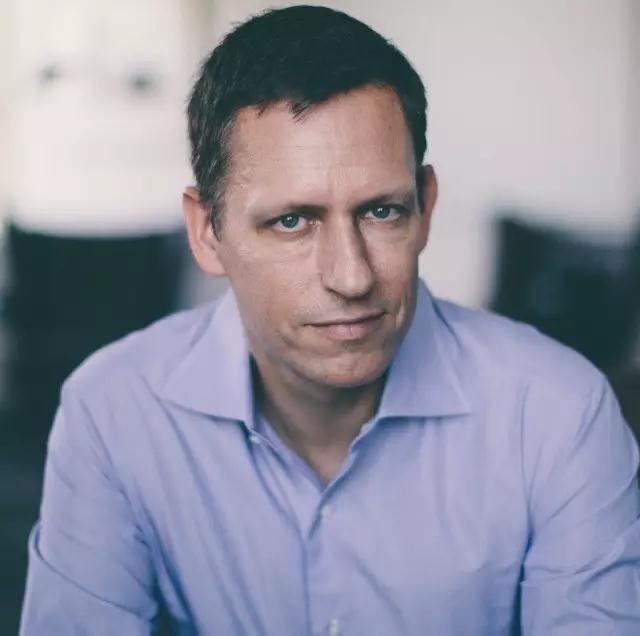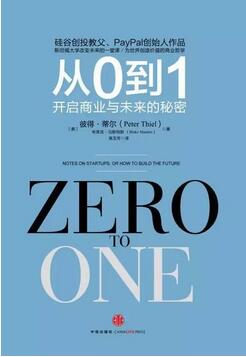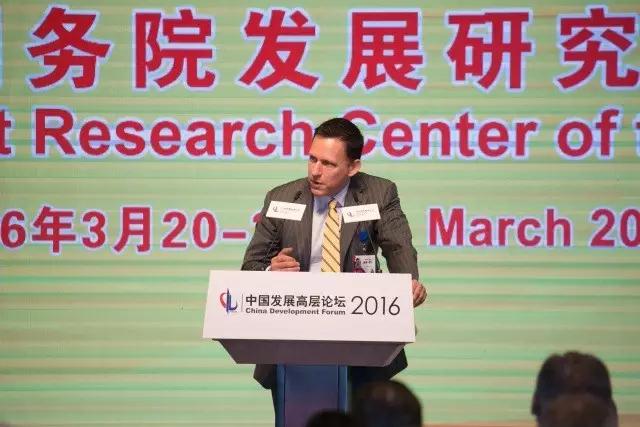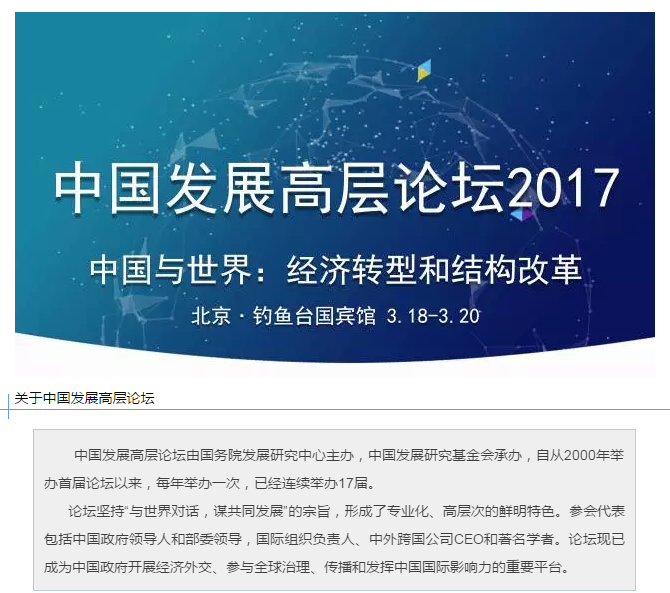彼得•蒂尔:政府所能做的最好的事就是放手
编者按
彼得•蒂尔告诉《财经》记者:“我认为最大的灵感来源于成功企业家的示范作用。从这个角度而言,向马云和马化腾等企业家的非凡事业学习,其影响力可能会超过任何政府项目。”
以下内容登于中国发展研究基金会与中国高端媒体《财经》杂志联手,于2017年推出的《中国发展高层论坛论坛2017会前刊》内文。

硅谷创投教父彼得•蒂尔(Peter Thiel )被人们看做是“一位逆向投资者”。最著名的投资则是—他是硅谷唯一高调支持特朗普的人。现在,特朗普入主白宫,人们才恍然大悟:蒂尔的确能把握 “做个少数派” 的机会。
此前,彼得•蒂尔不但高调为特朗普站台演讲,而且还出钱出力。对于这一点,彼得•蒂尔不仅直言不讳,而且依然坚信他的“少数派”选择之路。他接受《财经》记者专访时表示,“旧常态失灵、失效了,正因如此特朗普才当选了总统!特朗普总统决意做出新尝试,如果他行事一切照旧,那反而成问题了。”

作为硅谷风险投资人,PayPal 联合创始人兼硅谷Facebook董事会成员,彼得•蒂尔让中国人熟知是因为他的一本畅销书《Zero to One》,他认为人类社会的进步来自两方面,一方面是横向的发展,也就是从1到N,复制某种可行的模式从而推广并大规模使用;另一方面是纵向的发展,也就是从0到1,不断做新的尝试。有中国学者提出,美国的从0到1的能力,加上中国的从1到N的能力,将给双方带来巨大的合作红利,对此,彼得•蒂尔坦言,“我认为,美国公司和中国公司的确能够互补,但两国的公司都极具雄心壮志。美国公司想要拥有最大的规模,中国公司渴望创新。双方都希望实现多元经营而非局限于一种产品和一个产业。”
显而易见,彼得•蒂尔对“美国研发+中国制造”的合作路径并不认可,他认为现在中国市场和美国市场已经出现了很多明显不同的特点。他含蓄地指出:“由于两国的公司都给予本国市场更多的关注,美国公司可能会努力在美国制造更多产品,中国公司可能在中国进行更多的设计。但无论如何,美国公司将继续寻求与深圳等拥有强大基础设施的城市建立合作关系。”
一些学者总结,中国30年发展的模式就是,把其他国家先进的产品和技术引入中国,大到城市规划小到家用电器,并直接“复制”、“黏贴”,中国的后发优势就是复制那些在其他国家被验证可以提高效率和改善生活品质的产品。但是,复制的时代即将终结。
“从0到1”的创新正在中国大地发芽,中国的设计也在艰难地拱出泥土。那么,如何促进中国独创性的企业更多地诞生?彼得•蒂尔忠告:在美国,我们看到在信息科技领域有如此多的创新,最主要的原因是政府对这个领域的管控比其他行业少。从这种意义上来讲,政府所能做的最好的事就是放手。这样才能激发中国的企业家精神。
彼得•蒂尔告诉《财经》记者:“我认为最大的灵感来源于成功企业家的示范作用。从这个角度而言,向马云和马化腾等企业家的非凡事业学习,其影响力可能会超过任何政府项目。”
《财经》杂志记者王延春/文

彼得·蒂尔在中国发展高层论坛2016年会上发言
访谈实录
Caijing: During the US Presidential Election, Silicon Valley overwhelmingly opposed Donald Trump, but you went against the trend, supported him, and later became a member of his transition team. Some people are worried that President Trump has moved too far away the norm. Has recent events made any changes to your support for him?
Thiel: The norm wasn’t working; that’s why Trump won! It’s a good thing that President Trump is serious about taking a different approach. If he was going to continue business as usual, that would be a problem.
Caijing: What do you think of President Trump’s plan for creating jobs? How will it impact competitiveness of the US?
Thiel: Previous administrations have been focused on government programs and transfer payments, but having a good job is much more important to voters than receiving direct assistance from the government. I think Trump is right to recognize that.
Caijing: Will the new immigration policies put forward by the Trump administration hurt the Silicon Valley’s business, culture and creativity? And if so, how?
Thiel: Silicon Valley will continue to be strong. President Trump doesn’t want to stop immigration; he wants to attract the most talented people, which is similar to what Canada and Australia are already doing. That will be good for America and good for Silicon Valley.
Caijing: What do you think is the future of the tried and tested model of ‘designed in the USA, made in China’?
Thiel: As companies in both countries pay more attention to their domestic markets, they may try to do more manufacturing in the USA and more design in China. Nevertheless, American companies will continue to pursue partnerships with the powerful infrastructure of Shenzhen and places like it.
Caijing: Some have argued that the creativity of US companies and the scaling-up power of Chinese companies can work together to great effect. How to do you see the prospect of cooperation between US and Chinese Tech Companies?
Thiel: I think it’s true that American and Chinese companies can complement each other; however, I think companies in both countries are extremely ambitious. American companies want to master scale, and Chinese companies want to be creative. Both sides want to do everything rather than be limited to one thing.
Caijing: Most recognize that resource driven models are running out of steam, and innovation is the source of future growth for China. But there is no census on what innovation is, or how to inspire innovation. So do you have any ideas on how to promote innovation? What advice would you give to China’s entrepreneurs?
Thiel: I would tell Chinese entrepreneurs to be very skeptical of trends. If everyone else is already talking about key elements of your business strategy, that means you’re going to have a lot of competition.
Caijing: In your book Zero to One, you made an observation that the Chinese people behave pessimistically. Are you optimistic about China’s future? What do you think could happen in China in the next few decades?
Thiel: In China I was impressed not so much by pessimism than by what I call a “definite” attitude. “Definite” thinking means making long-term plans instead of improvising haphazardly. When you make definite plans, you pay close attention to limitations and constraints. I think Chinese people are very aware of the limits on further growth. That can look like pessimism, but it can also lead to creativity. Chinese people know there are limits, and they know the future won’t get better automatically. Because of that, they know they need to work hard, and that makes them more likely to succeed.
Caijing: Your book also mentions uniqueness and non-replicability. What kind of environment should the Chinese government establish to see more original companies emerge?
Thiel: It’s hard to say; in the United States, one of the big reasons we’ve seen so much innovation in information technology is because it has been less regulated than other industries. In that sense, the best thing the government can do is just to get out of the way.
Caijing: Innovation comes from entrepreneurship, and from their products and creations. The creation of new production models is a process of creative destruction. How can the government stimulate entrepreneurship in China?
Thiel: I think the biggest inspiration comes from the example set by successful entrepreneurs. In that sense, learning about the phenomenal careers of people like Jack Ma and Pony Ma might be a bigger influence on people than any government program.
Caijing: At present, China is encouraging mass entrepreneurship and innovation, as a grass-roots movement. Can grass root entrepreneurs become a source of innovation? What kind of market mechanisms are needed?
Thiel: Innovation happens when people set out to do things from scratch. An inexperienced person doing an unfamiliar job might invent something new that a well-trained expert never would have thought of. In that sense, it could be good to have many different people working on new ventures at a small scale. What’s important is that they are all working on different things instead of competing to do the same things in the same way.
转载请注明"转自‘中国发展高层论坛’
微信公众号DRC_CDF"





